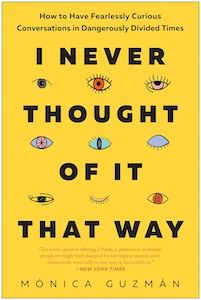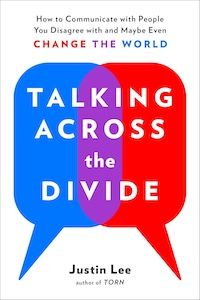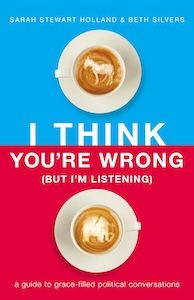
How to Talk About Politics Without Ruining Your Relationships
There’s a lot of talk lately about “lowering the temperature” of political discourse, and those of us who came of age before the 2016 election can confirm that it is indeed possible to get along with friends, family, and coworkers whose political views differ—even dramatically—from your own. And not only is it possible, it used to be the norm.
In a democracy, it’s just part of the deal that we’re going to disagree with about half of our fellow citizens on any given issue. That’s a feature, not a bug. We’re supposed to have a productive tension that leads to conversation and compromise, but in recent years, disagreement and discussion have given way to anger and argumentation. (Pick up Ezra Klein’s Why We’re Polarized for a deep dive into why.)
I’m certain about very few things in politics, but this is one of them: a return to civility in civic life will require all of us engaging in good faith to do some work.
Here are some books to get us started:
Sarah Stewart Holland and Beth Silvers, who host the popular Pantsuit Politics podcast, started out on opposite sides of the aisle. When they launched the show in late 2015, their goal was to “prioritize curiosity over the conflict that often drives political conversations.” For nearly a decade, they have modeled “grace-filled” political conversations in multiple episodes each week, modeling what it means to listen with the desire to understand and share with the desire to connect, not convince. In I Think You’re Wrong (But I’m Listening), Holland and Silvers translate the skills they’ve practiced on-air into practical tips readers can take into our relationships to “bring the same care and respect to policy discussions that we bring to the rest of our lives.”
I Think You’re Wrong (But I’m Listening) gets to the deep truth that the only thing you can control is how you show up. If you want to feel better (or just less gross) about the political conversations that pop up in your life, their guidance will get you started.

“We think we have the answers, but we need to be asking a lot more questions.”
In I Never Thought of It That Way, Mónica Guzmán, who works with Braver Angels, an organization devoted to fostering cross-partisan conversation, offers a guide for leveraging curiosity to have healthier conversations about heavy issues. Guzmàn knows of what she speaks: she is liberal, and her parents are two-time Trump voters. Her advice draws from real-life conversations in her own living room, social media, and an array of community spaces with the aim of addressing the crisis of “broken conversations among confounded people.” Learn how to ask the questions you’re afraid to bring up, find unexpected common ground, and walk away from even the most heated discussion having learned something new.
If your family or friend group (or book club or church or etc.) is open to taking active steps toward real solutions, this would be a terrific book to work through collectively.

Okay, so let’s imagine the magical future in which we’ve achieved a return to civil discourse. How do we then begin to change some minds? Justin Lee’s Talking Across the Divide has some ideas.
Lee identifies five key factors that make us resistant to differing opinions and combines psychological research with his own experiences mediating challenging conversations to help us understand how our opponents think. When we truly understand where someone else is coming from and what’s important to them, we can learn to share our ideas and opinions within a context that might change their minds. And if they do the same for us, well, who knows what might happen.
Also worth checking out: for the politics junkies in the house, Yanna Krupnikov’s The Other Divide offers a helpful reminder that we’re the weirdos and that most people—all along the political spectrum—are much less involved in day-to-day political happenings. I know. 🤯
This is a big, thorny topic, and I’d love to hear about your recommendations. Shout them out in the comments.
The comments section is moderated according to our community guidelines. Please check them out so we can maintain a safe and supportive community of readers!










Leave a comment
Become an All Access subscriber to add comments.